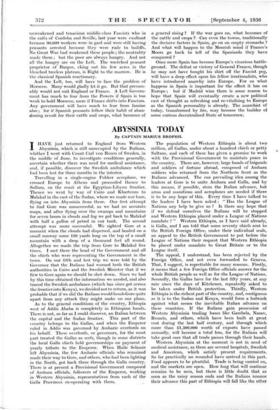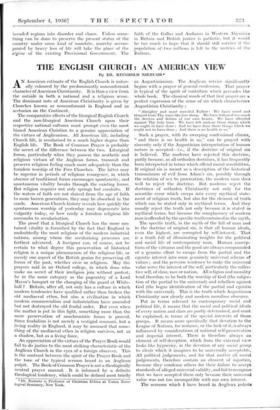ABYSSINIA TODAY
By CAPTAIN MARIUS BROPHIL
IHAVE just returned to England from Western 1 Abyssinia, which is still unoccupied by the Italians, -whither I went with Count Carl von Rosen of Sweden, in the middle of June, to investigate conditions generally, ascertain whether there was need for medical assistance, and, if possible, discover the Swedish ambulance which had been lost for three months in the interior.
Travelling in a single-engine Fokker aeroplane, we crossed Europe to Athens and proceeded thence to Sollum, on the coast at the Egyptian-Libyan frontier. Thence we went by way of Cairo and Khartoum to Malakal in the east of the Sudan, where we made our base, flying on into Abyssinia from there. Our first attempt to find Gore was unsuccessful, as we had no accurate maps, and after flying over the swamps and mountains for seven hours in clouds and fog we got back to Malaital with half a gallon of petrol in our tank. The second attempt was more successful. We sighted Gore at a moment when the clouds had dispersed, and landed on a small runway some 120 yards long on the top of a small mountain with a drop of a thousand feet all round. Altogether we made the trip from Gore to Malakal five times. I met there the head of the Government and all the chiefs who were representing the Government in the town. On our fifth and last trip we were told by the Governor that the Italians had warned both the British authorities in Cairo and the Swedish Minister that if we flew to Gore again we should be shot down. Since we had by this time obtained the information we needed, and also traced the Swedish ambulance (which has since got across the frontier into Kenya), we decided not to return, as it was probable that if we did the Italians would bomb Gore quite apart from any attack they might make on our plane. As to the general conditions of the country, Ethiopia west of Addis Ababa is completely in Ethiopian hands. There is not, so far as I could discover, an Italian between the capital and the Sudan frontier. This part of the country belongs to the Gallas, and when the Emperor ruled in Addis was governed by Amharic overlords on his behalf. These overlords, or governors, for the most part treated the Gallas as serfs, though in some districts the local Galla chiefs held governorships on payment of yearly tribute to the Emperor. When Haile Selassie left Abyssinia, the few Amharic officials who remained made their way to Gore, and others, who had been fighting in the North, got back there through the Galla country. There is at present a Provisional Government composed of Amhara officials, followers of the Emperor, working in Western Abyssinia, representatives from each of the Galla Provinces co-operating with. them. The population of Western Ethiopia is about two million, all Gallas, under about a hundred chiefs or petty Sultans, and each of these has given a promise to work with the Provisional Government to maintain peace in the country. There are, however, large bands of brigands and soldiers of fortune abroad, composed of Amhara soldiers who returned from the Northern front as the Italians advanced. The one prevailing idea among the leaders at Gore is to unite Amhara and Galla, and by this means, if possible, stem the Italian advance, but arms and munitions and aeroplanes are needed if there is to be any hope of this. Every time I have talked to the leaders I have been asked : " Has the League of Nations any help to give us ? Is there any hope that if we defend ourselves the Italians will be stopped and Western Ethiopia placed under a League of Nations mandate ? " Western Ethiopia, as I have said already, is Galla, and I am told that some seventy chiefs sent to the British Foreign Office, under their individual seals, an appeal to the British Government to put before the League of Nations their request that Western Ethiopia be placed under mandate to Great Britain or to the League itself.
The appeal, I understand, has been rejected by the Foreign Office, and not even forwarded to Geneva. That, I suggest, is regrettable for many reasons. Firstly, it means that a few Foreign Office officials answer for the whole British people as well as for .the League of Nations. Secondly, the Gallas have for the last fifty years, at any rate since the days of Kitchener, repeatedly asked to be taken under British protection. Thirdly, Western Ethiopia is the richest part of the country, and, contiguous as it is to the Sudan and Kenya, would form a bulwark against what seems the inevitable Italian advance on these countries. If the Italians gain possession of Western Abyssinia trading bases like Gambela, Nasav, Rosaris, and others, which have been built at great cost during the last half century, and through which more than £1,500,000 worth of exports have passed annually, will become a total loss, for the Italians will take good care that all trade passes through their hands.
Western Abyssinia at the moment is not in need of medical assistance, as there are several hospitals, Swedish and American, which satisfy present requirements. So far practically no wounded have arrived in this part. Food appears to be plentiful. Trade is being carried on, and the markets are open. How long that will continue remains to be seen, but there is little doubt that as soon as the rainy season ends and the Italians resume their advance this part of Ethiopia will fall like the other invaded regions into disorder and chaos. Unless some- thing can be done to preserve the present status of the country under some kind of mandate, anarchy accom- panied by heavy loss of life will take the place of the regime of the existing Provisional Government. The faith of the Gallas and Amharas in 'Western Abyssinia in Britain and British justice is pathetic, but it would be too much to hope that it should still survive if the population of two millions is left to the mercies of the Italians.







































 Previous page
Previous page